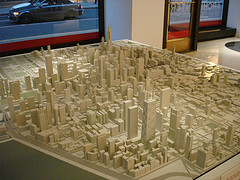 Last week I was hosted by Thomas Baldauf of the Austrian Environment Agency. I did not know Thomas but had got his name from a friend. After a short email he immediately agreed to host me without any questions which surprised me a lot. Unfortunately Thomas, the lead of the development team, did not have time to work with me in person but had prepared some developers from his team for my visit. I worked with Nexhat Gashi on a small feature of their newest web application which is based on JSF technology. I did not know JSF before I started my tour, but saw it all the time when pairing with people. Probably I will be fluent with JSF until end of November ;-)
Last week I was hosted by Thomas Baldauf of the Austrian Environment Agency. I did not know Thomas but had got his name from a friend. After a short email he immediately agreed to host me without any questions which surprised me a lot. Unfortunately Thomas, the lead of the development team, did not have time to work with me in person but had prepared some developers from his team for my visit. I worked with Nexhat Gashi on a small feature of their newest web application which is based on JSF technology. I did not know JSF before I started my tour, but saw it all the time when pairing with people. Probably I will be fluent with JSF until end of November ;-)I also worked with Martin Lackner whom I knew as long time attendee of our Eclipse DemoCamps in Vienna. Martin, an Eclipse platform veteran, worked on an MDA prototype using Xtext. I had worked with the older versions 0.7 and 1.0 before and he had prepared all the nitty-gritty details in the previous week. I reviewed his DSL and probably spoilt all his fun by proposing a different, shorter syntax. We moved forward very fast. In only one day we created a technical language to define entities and aggregates, together with full editor support, code completion, validation and proper formatting. Such is the power of Xtext - I love it. If you do not know Xtext, I really encourage you to check it out. The Eclipse Xtext project has excellent documentation and many examples which provide a starting point to get your DSL up and running in no time.
Free Lunch
 The only compensation I asked for pairing was food and beverages throughout the day. It worked out well - till now I have been provided with free lunch every day. All my hosts were very polite and offered me coffee or drinks and asked me for my preferences when choosing places to eat. I never asked for anything special but went for lunch where my partners went. I visited take-away noodle stores, staff canteens and fancy restaurants. Having lunch with many people, together with the various places in Vienna I have been to, was a culinary trip of its own.
The only compensation I asked for pairing was food and beverages throughout the day. It worked out well - till now I have been provided with free lunch every day. All my hosts were very polite and offered me coffee or drinks and asked me for my preferences when choosing places to eat. I never asked for anything special but went for lunch where my partners went. I visited take-away noodle stores, staff canteens and fancy restaurants. Having lunch with many people, together with the various places in Vienna I have been to, was a culinary trip of its own.The two weeks I spent away from home, I stayed in a hotel. The host company refunded me 600 Euro for my expenses per week. It was a nice hotel, expensive but comfortable. The money was sufficient because I saved on food, eating in the company canteen now and then. Staying in a hotel and working all day was acceptable for the two weeks, and I enjoyed the rich breakfast buffet including bacon and scrambled eggs. But I would not like to stay in a hotel for extended periods of time. I am not a travelling person and I never worked like that. I enjoy going home after work, where connectivity is good and wireless network is free ;-)
Can PL/SQL be Clean?
At the end of the week I spoke at the Austrian Oracle User Group. The organizer had planned an event focusing on clean development and three friends had recommended me to him independently. I agreed to give a presentation but was not sure about the topic I should talk about. For talking to an Oracle user group, the first thing that came to my mind was PL/SQL, Oracle's database language. I have seen horrible pieces of PL/SQL and the question was if it can be written in a clean way? According to Michael Feathers, the author of Working Effectively with Legacy Code, "clean code looks like it was written by someone who cares." I presented his quote as first rule of clean code. Continuing the discussion I listed several books about clean code, including Code Complete by Steve McConnell. Steve said to "write programs for people first, computers second", which I defined as second rule of clean code. Following both rules it was obvious that even PL/SQL can be written in a clean way. I got good feedback on my presentation, especially that it was very entertaining, so I encourage you to check out the slides on Slideshare.








No comments:
Post a Comment